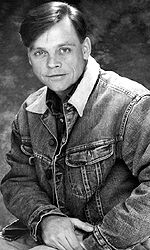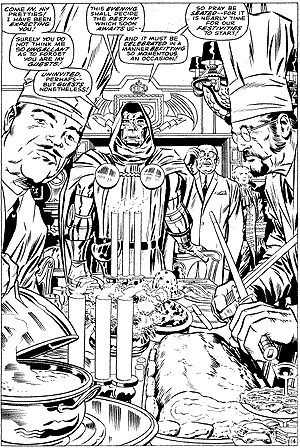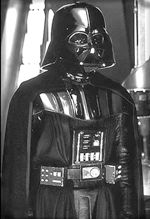Mark Hamill Interview
Conducted by John Morrow
From Jack
Kirby Collector #28
(The ever-versatile Mark Hamill is best known for playing Luke Skywalker
in the original Star Wars movie trilogy, which contained more than a
few similarities to some of Kirby's comics. Recently, Mark has
been in great demand as a voice-over artist for animation, most notably
as the voice of the Joker on Warner Brothers' Batman franchise.
He also wrote the Dark Horse Comics mini-series Black Pearl, which has
been developed as a computer game by game manufacturer Access. This
interview was conducted by phone on February 13, 1999. Our heartfelt
thanks to Bruce Timm for facilitating this interview.)

THE JACK KIRBY COLLECTOR: To start this discussion, I guess
we need to know how familiar you are with comics, and particularly with
Jack Kirby.
MARK HAMILL: I've been a fan of comics since I was a kid.
Certainly anybody that had the interest I had in comics knew who Jack
Kirby was. Later, I became much more aware of his plight, vis-a-vis
getting his artwork back from Marvel Comics. Bill Mumy and Miguel Ferrer
are two friends of mine who are both actors, but who I met through comic
books rather than through acting. They were the ones that arranged to
have this dinner where Jack and Roz were invited, and Jerry Siegel and
his wife were there. Bob Kane was there and [his wife] Elizabeth. When
I was invited I said, "Sure, I'd love to come." Just
in terms of their importance to the industry, it'd be like having
dinner with Max Fleischer and Walt Disney and Walter Lantz to the cartoon
industry. They were titans, really.
TJKC: Where was that dinner held?
MARK: It was at Bill Mumy's house in Laurel Canyon. I also
went out to [Jack's] house once in Thousand Oaks. [Jack] was a
very self-effacing guy. You'd never know from his demeanor how
important he really was. We were joking, and I said that when I first
saw Darth Vader, I thought, "Oh, it's Doctor Doom." (laughter)
He certainly didn't say, "Oh, he took my ideas," or any
of that kind of stuff. He was content with who he was and his abilities.
TJKC: What was your impression of Jack when you met?
MARK: One of the things that struck me about Jack was the similar
temperament, and even the physical similarities between him and a filmmaker
by the name of Samuel Fuller. Probably their backgrounds were similar:
They're both of a certain generation that fought World War II as
teenagers; both were from New York, and both were really sort of "men's
men"—cigar-chomping, opinionated. When I say opinionated,
it's different than when I say he was self-effacing. He was like
Sam in that way. They'd been through the eye of the storm at a
very early age, and I think it shaped their outlook and the way they
dealt with life; but he was fun and funny, and fun to be around. If
anybody had the right to be angry or upset that he had not been fully
recognized, or deserved his own artwork back, it was him—but it
didn't infuse his personality, if you know what I mean. He seemed
to be somebody who was a lot more adjusted to it than even his supporters.
TJKC: So it sounds like you're pretty familiar with Kirby.
Did you grow up on his books?
MARK: I wasn't really allowed to have comic books in my
house. We could buy them for special occasions like long trips, but
the network of friends I had was such that you'd trade books, or
go to other people's houses and read them. There were people that
were real Marvel buffs, who thought I was kind of a weenie for reading
DC and stuff. (laughter) I don't know that I knew Jack Kirby back
then, but you could just recognize the style.
TJKC: What part of the country did you grow up in?
MARK: My dad was in the Navy, so we moved every couple of years.
In fact, sometimes I think maybe that had something to do with why I
read comic books. They were a common ground; they were a way to deal
with your solitude, but at the same time, if you saw someone reading
comic books in a new place, you had something to talk about. That was
a great common denominator.
TJKC: When did you start reading comics?
MARK: I started reading comic books in the Sixties. I was born
in 1951, so I didn't really start loving comics until 1961, '62.
I loved all those monsters Kirby used to draw. I loved the massiveness
of the creatures. I didn't really understand all the minutiae;
I didn't really study the comic book industry until I was in college,
learning about the Kefauver Committee, and the Comics Code, and Dr.
Wertham.
TJKC: So you were still reading comics in college?
MARK: That's sort of where I rediscovered them. I liked
all the underground artists, and going to used bookstores, I'd
see books I recognized from when I was a kid. I started to really become
aware of who these people were in the early Seventies, when I started
collecting comic books. Before then, I wasn't able to save all
my books, so I didn't have that many. I was one of seven kids,
so there wasn't a lot of leeway there; you get to a certain age,
and they kind of shame you out of your comic books.
TJKC: In the early Seventies, Kirby went to DC. Did you pick
up his Fourth World series? Were you aware of Darkseid and the New Gods?
MARK: Oh, definitely. By that time I definitely knew who he was,
and I wanted to see what he would do. I didn't follow them slavishly
month after month, but I knew it was a big deal that he was going from
Marvel to DC.
TJKC: A lot of Kirby fans picked up on what they perceived as
similarities between the Fourth World and Star Wars. Did you notice
any of that?
MARK: Well, I made the Doctor Doom reference, and obviously you're
dealing in all those kinds of space opera elements, and science-fiction
elements. If anything, the movies were such a pastiche; there were influences
all over the place. Even though I never discussed Jack Kirby directly
with George [Lucas]... from pirate movies to comic books to cowboy movies,
people were telling me references all the time.
 
This scene of Doom feasting in FF #87 is reminiscent of one featuring
Darth Vader from the original Star Wars movie.
Dr. Doom ™ & © Marvel Characters, Inc. Darth Vader ™ &
© Lucasfilm, Ltd.
TJKC: Any other observations about Kirby?
MARK: One thing I think is kind of telling is, at that dinner
Bob Kane got a kick out of mentioning to Bill Mumy that the Batman TV
show sort of cleaned Lost In Space's clock, and [he was] laughing
very Penguin-like at that. (Mumy stood his ground. He said, "You
know, Bob, Lost In Space was on the air BEFORE Batman, and Lost In Space
was on the air AFTER Batman.") But you'd never get that with
Jack. Jack wasn't there saying, "Well, I created this guy
and this guy..."; Jack didn't lord it over everybody. It was
fun going to his house and seeing where he worked, and his workboard.
I was very grateful for his hospitality; he was a really warm guy—and
of course Roz was just a knockout.
TJKC: Did she offer you the usual milk and cookies? (laughter)
MARK: Sure. Everybody knows what a great lady she was. They were
the legendary couple, and like I say, at Bill's dinner, he never
seized the opportunity for it to turn into an ego-fest—and of course
Jerry Siegel was very self-effacing, and very quiet, and not as bombastic
as Bob was.
TJKC: I guess that's indicative of the amount of credit
they got over the years. The one who wouldn't hesitate to speak
out got the better deal.
MARK: I guess. It certainly was a contrast. Here you had Bob
Kane's logo on everything he ever did, and they didn't make
their deals that far apart. It surprised me in many ways.
TJKC: How did you get into doing voice-overs for animation,
particularly the Joker on the Batman animated series?
MARK: I sort of backed into it. I knew they were going to do
65 episodes, and I knew Batman. I figured, if their role model was the
Fleischer Superman cartoons, this was the best opportunity yet to do
stories closer to what's in the comic books. With 65 episodes,
they wouldn't be trapped into what the movies and the TV show did,
with a big guest star super-villain defeated at the end. I thought they'd
be able to do the variety of stories they do in the comic books; from
mysteries to love stories, to whatever. I hoped they'd do this
really right.
Basically, I got an interview; I thought I was going to go pitch some
stories and do some writing assignments. There was a mix-up; they said,
"No, no, the writing assignments are all taken; we wondered if
you were interested in doing a voice for us." I said, "Sure."
They gave me a voice in "Heart of Ice," which is the first
Mr. Freeze episode. I played Ferris Boyle, the guy who pushes him into
the equipment and turns him into Mr. Freeze. I was really impressed
with the script; I couldn't believe how melancholy it was for a
children's cartoon. It was a fun voice; the guy was a real phony.
He was outwardly a real philanthropist, but then you see that he's
not such a nice guy.
Having done that, I got a call a couple of months later to audition
for the Joker. I thought it'd be fun, but I didn't really
think in terms of actually getting the job. Based on the one drawing
I saw, I came up with whatever voice I came up with, and the laugh which
they said was really crucial to my getting it. That opened the floodgates;
that made such a splash, and the Joker's such a high profile character,
there was a certain amount of, "Let's jump on the bandwagon
and make Mark our villain." (laughter) So I wound up doing Hobgoblin
on Spider-Man, and Gargoyle on Incredible Hulk, and Dr. Jack on Phantom
2040—lots of villains. But it's fun; it's like being
a radio actor. You don't have to worry about your physical appearance
being wrong for the part. I really love it.
TJKC: Last question; would you say Kirby has had an influence
on you at all?
MARK: I think about him now. I do so many cartoon voice-overs,
and I'm just very aware of the forefathers of all of this.
TJKC: Thanks for taking time to do this interview. Is there
anything you'd like to add?
MARK: I only had very limited contact with [Jack]. I just feel
lucky to have met him at all.

Sign up here to receive periodic updates about what's going on in
the world of TwoMorrows Publishing.

Click here to download
our new Fall-Winter catalog (2mb PDF file)
|
